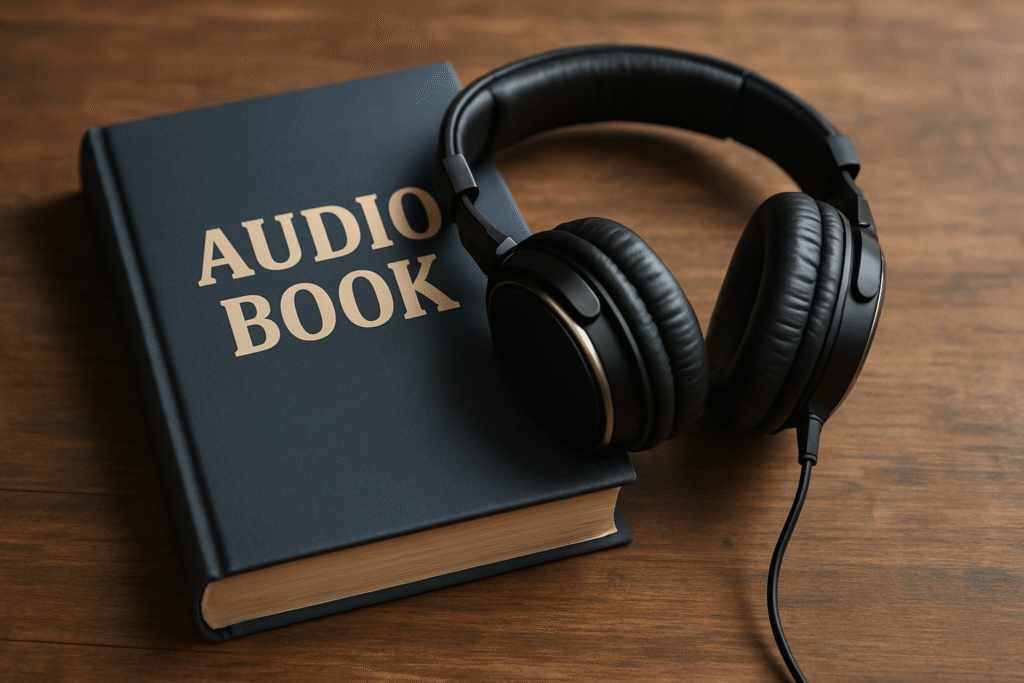Introduction
Books are no longer defined by their physical forms of paperback or eBooks. Now, audiobooks dominate as one of the fastest-growing areas of publishing. Whether it’s busy professionals tuning in while driving or students absorbing new information via storytelling, audio has created new opportunities for both readers and writers.
We at Olive Publishers have experienced how adding an audiobook version to your list benefits the author. But how do you get started? Why are audiobooks going mainstream? And what do you need to know before making one? In this comprehensive guide we will answer all of the above and more.
What is an Audiobook?
An audiobook is just a book that has been recorded into the audio format. Instead of reading with your eyes, you just listen to the words spoken aloud through narration. Audiobooks can be downloaded on smartphones, played in cars or streamed through platforms like Audible, Google Play Books and Spotify.
Why Are Audiobooks So Popular?
Convenience
We are, after all, multitasking almost every time we do something driving while listening to a podcast, or exercising at the gym or cooking and talking. Audiobooks are an organic extension of this lifestyle.
Accessibility
For people with visual impairments or learning difficulties such as dyslexia, audiobooks offer a way to enjoy books with no obstacles.
Expanding Market Reach
Writers who sell audiobooks reach readers who might never open a print or digital book.
Growth of the Audiobook Market
The worldwide audiobook market has flourished in the past few years. Revenues are in the billions and double-digit growth year-on-year is evident. Genres among the best sellers range widely, from self-help to business and fiction.
For authors, this means opportunity. If you’re not making audiobooks, you’re missing a huge audience.
Fiction vs. Non-Fiction in Audiobooks
Fiction Audiobooks
- Enjoy excellent narration and character voices.
- Young adult novels, romance thrillers and fantasy.
- Sound design that draws the listener in can build suspense inform narrative.
Non-Fiction Audiobooks
- Straightforward, educational, and motivational.
- Business, self-improvement and biography books are some of the best-selling.
- Clear, professional narration is more important than dramatic flair.
How to Create an Audiobook
Step 1: Prepare Your Manuscript
- Your book will also need to be proofed and formatted before recording.
Step 2: Choose Narration Style
- Narrator: Good for memoirs or personal stories.
- Professional narrator – best for most genres and offers consistent level of audio quality over the entire length.
Step 3: Recording Options
- DIY with home equipment.
- Professional studio recording.
- Hiring freelance narrators off of platforms like ACX or Fiverr.
Step 4: Editing and Mastering
- Audio must meet platform standards. Editing will weed out errors and background noise, and it will help with pacing.
Step 5: Distribution
Use platforms like:
- Audible (ACX)
- Findaway Voices
- Google Play Books
- Spotify
- Apple Books
Audiobook Production Costs
Prices differ based on the length of a book, level of narrator experience and studio use. On average:
- $150 to $300 per finished hour for narrators.
- It may be $2,000 to $5,000 to produce a 50,000-word book.
- DIY can help to keep your expenses down, but quality should never be sacrificed.
Marketing Your Audiobook
Optimize Metadata
Good title, keywords and description make a site discoverable.
Leverage Social Media
Record brief audio clips for Instagram, LinkedIn or TikTok.
Bundle with eBook/Print
Provide some of the discounted packages to get more buyers.
Seek Reviews
Tell listeners how to leave a rating on Audible and Goodreads.
Podcast Collaborations
Bribing would be promoting with guest appearances or sponsorship on podcasts.
Common Mistakes to Avoid
- Poor-quality narration.
- Skipping proofreading before recording.
- Overpricing compared to market standards.
- Ignoring marketing once published.
The Case for Audiobooks and Why Authors Should Get on Board
- Reach a broader audience.
- Increase revenue streams.
- Build brand authority.
- Make your writing career future-proof in the age of exploding audio consumption.
How Olive Publishers Can Help
At Olive Publishers, we certainly don’t stop at print and e-publishing. We help authors through the world of audiobooks, from the initial manuscript to finding a narrator, the production process and even distribution. NEW AUDIOBOOK LISTENERS Today’s expanding audiobook market means there are new listeners out there just for you, even if you’re a first-time author or have been at the writing game for a long time.
Conclusion
Audiobooks aren’t a fad they’re the future of publishing. When reading trends change, you need to publish your book in different formats to remain competitive and make money. If you’re a writer questioning whether to do it, the answer is easy: yes. Start small, but start now.
📢 At Olive Publishers, we want to work with you to turn your manuscript into a compelling audiobook that resonates with listeners across the globe.
FAQs
Q1. How long does it take to produce an audiobook?
Depending on the length and complexity of the book, it can be done in 4–8 weeks.
Q2. Can I record my own audiobook?
Yes, particularly for a memoir or a personal story. But professional narrators typically turn in better work.
Q3. What types of books do best as audiobooks?
The charts are dominated by self-help, business, romance, fantasy and thrillers.
Q4. Do audiobooks make money?
Yes, if marketed well. Some writers have steady streams of royalties from audiobook sales.
Q5. Where can I get my audiobook published?
For distribution, try platforms like Audible, Apple Books, Google Play Books and Spotify.




